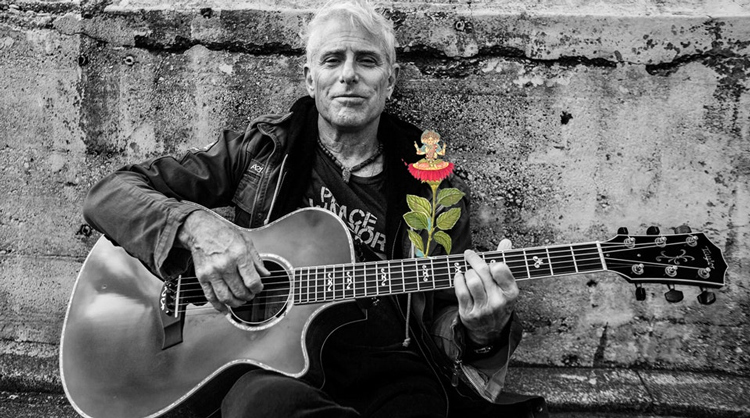Jai Uttal is a pioneer in the United States’ world music community. His eclectic east meets-west sound has put his music at the forefront of the world fusion movement. Jai Uttal’s musical roots embrace a rich variety of cultures and traditions that span the globe and the centuries. From the traditional music of the Appalachian Mountains to the passionate strains of Bengali street singers from the haunting rhythms and melodies of ancient India to contemporary electric rock sounds Jai’s music distills the essence of diverse musical forms.
As a child in New York City, Jai’s home was filled with music. He began studying classical piano at the age of seven and later learned to play old time banjo harmonica and guitar. His musical interests encompassed a wide variety of styles and over the years he experimented with many forms of musical expression.
Eventually this led him to the work of India’s National Living Treasure Ali Akbar Khan. At the age of 19 Jai moved to California to become a student of Khansahib for traditional voice training and to learn the sarod a 25-stringed Indian instrument. Later he traveled to India where he was deeply inspired by the Bauls the wandering street musicians of Bengal. Jai settled among them communicating only through music which ultimately helped establish his unique style.
During these early visits to India Jai also met his Guru Neem Karoli Baba and spent time with many great beings of both the Hindu and Buddhist traditions. He became deeply absorbed in the practice of kirtan the ancient yoga of chanting or singing to God. This form of prayer became the core of his musical and spiritual life.
When Jai returned to the United States his music had been transformed. He continued to study Indian music diligently while also performing in reggae, R&B, punk and blues bands. He also began leading kirtan groups all over the country. The combination of Jai’s exceptional vocals and exotic instrumentation produced a new and captivating sound.

In 1991 Triloka Records released his debut album Footprints featuring world music innovator Don Cherry and Indian vocalist Lakshmi Shankar. The album received critical acclaim and led Jai and his band the Pagan Love Orchestra to international prominence. By the time his second album Monkey was released in 1993 Jai and the Pagan Love Orchestra had an enormous fan base with a top ten record on the world music charts.
In 1994 Beggars and Saints was released a tribute to the Bauls of Bengal and again the album received international recognition solidifying Jai Uttal’s position as a world music visionary. During this time Jai also produced two CD’s for his teacher Ustad Ali Akbar Khan. Combining the brilliance of Khansahib’s playing and composing with Western orchestration Journey and Garden of Dreams became extremely popular in the Indian community.
Jai’s fourth release Shiva Station was another leap forward. Capturing the raw urgency of his live performances with the Pagan Love Orchestra and adding the mixing wizardry of veteran producer Bill Laswell Shiva Station presented traditional chants in a totally new way. The concerts at that time united the temple and the nightclub the sacred and the worldly; emphasizing the underlying theme that spirituality and devotion can pervade all aspects of life.
Meanwhile, with the rise of interest in Yoga, Jai was receiving more and more requests to lead kirtan workshops and concerts all over the world. In the last few years chanting has brought him to Israel Fiji Brazil Germany Switzerland and India. Jai released a live kirtan CD titled Nectar to begin to chronicle these powerful events.
Finally in February of 2002 Jai Uttal and the Pagan Love Orchestra released Mondo Rama on Narada Records. The product of several years of deep musical and self-exploration Mondo Rama combined Brazilian influences, Hebrew prayers, Appalachian Blues, Beatles psychedelia and of course Indian music and chants, Mondo Rama explodes from the speakers in celebration and rebirth. “I went through many difficult heart-wrenching transformations in the last year” says Jai, “and I decided to put it all into this CD. The anguish the pain the joy and the redemption. Mondo Rama means the World is Rama or Everything is God. This CD is an attempt to express that feeling and the sense of surrender and gratitude that I try to remember everyday“. Mondo Rama went on to be nominated for a Grammy as Best New Age Album of 2002.
Jai adds, “world music is music from everywhere. Music that creates bridges. Music that unites hearts and cultures. Music that brings peace.”
In recent years Uttal has drifted away from world music, focusing on music for the new age market.
In 2020, Uttal released his first all instrumental album titled Gauri’s Lullaby, featuring meditative compositions originally made for his wife’s yoga practice.
Discography:
Footprints (Triloka Records, 1991)
Monkey (Triloka Records, 1993)
Beggars and Saints (Triloka Records, 1994)
Shiva Station (Triloka Records, 1997)
Spirit Room (Triloka Records, 2000)
Nectar (Etherean, 2000)
Mondo Rama (Narada Records, 2002)
Kirtan (Sounds True, 2004)
Music for Yoga and Other Joys, with Ben Leinbach (Gemini Sun Records, 2004)
Pranayama (Pavana Suta Music, 2005)
Loveland – Music for Dreaming and Awakening with Ben Leinbach (Gemini Sun Records, 2006)
Dial M for Mantra (Sounds True, 2007)
Thunder Love (Nettwerk, 2009)
Bhakti Bazaar (Sounds True, 2010)
Queen of Hearts (Nutone, 2011)
Kirtan Kids (Sounds True, 2011)
Lifeline, with Ben Leinbach (Sounds True, 2014)
Return to Shiva Station (Sounds True, 2014)
Roots, Rock, Rama! (Mantralogy, 2017)
Gauri’s Lullaby (Pavana Suta Music, 2020)


